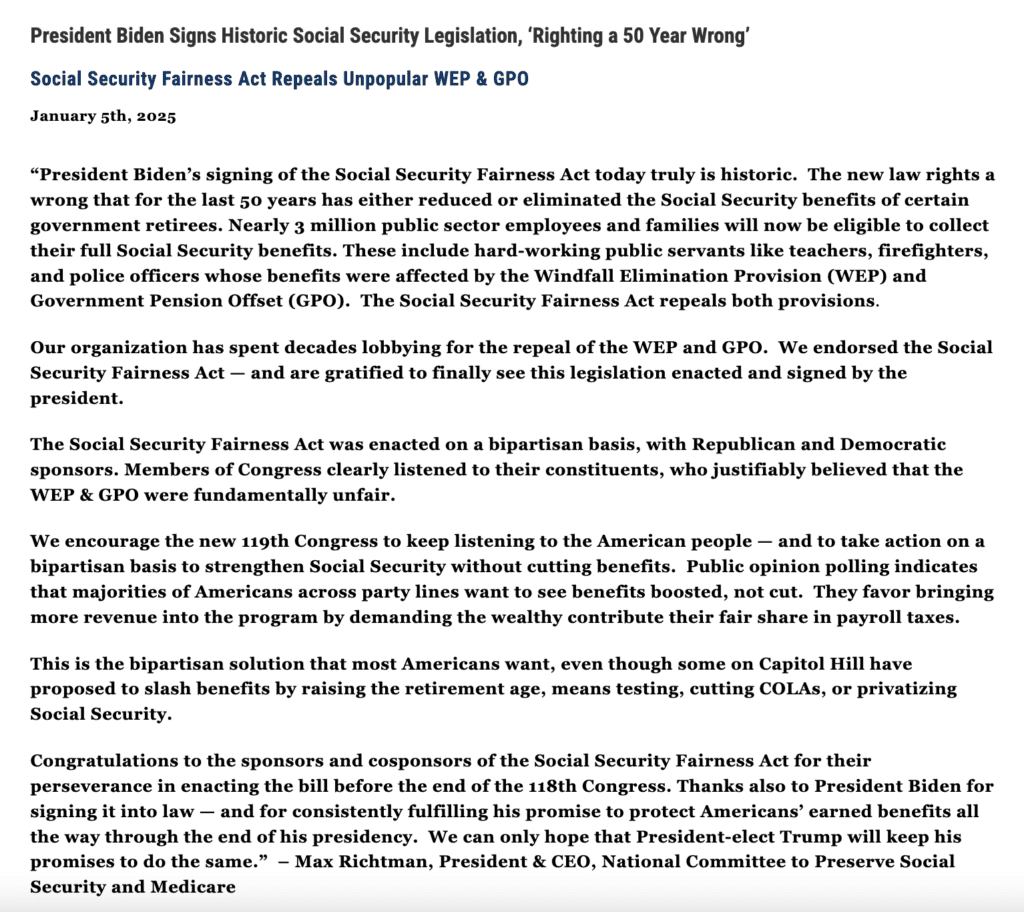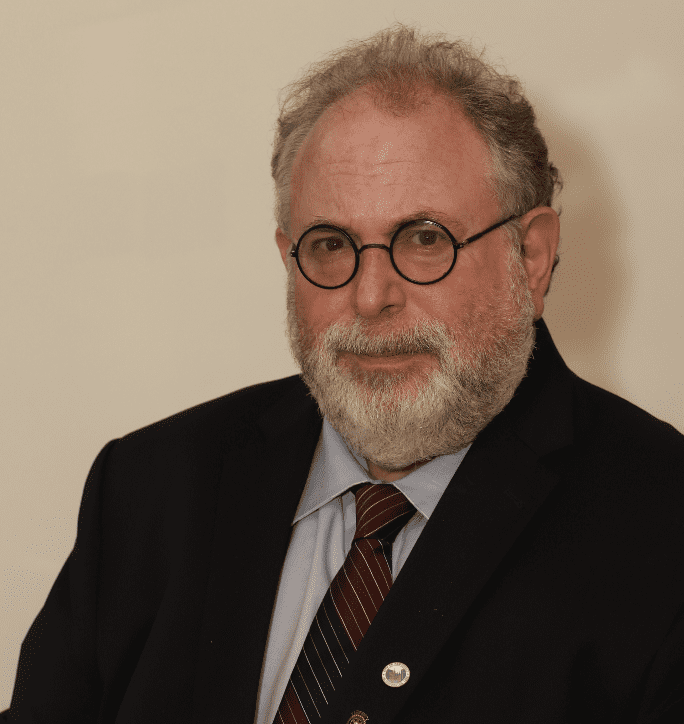Search Posts
Recent Posts
- Vinny Paz to be inducted TODAY into the International Boxing Hall of Fame – CES Boxing June 7, 2025
- In the News… quick recap of the week’s news (6.7.25) June 7, 2025
- Burn with Kearns: Strong without the spend: How scraps became strength tools – Kevin Kearns June 7, 2025
- Rhode Island Weather for June 7, 2025 – Jack Donnelly June 7, 2025
- How to advocate for threatened properties: The Heritage Alliance of Pawtucket June 7, 2025
Categories
Subscribe!
Thanks for subscribing! Please check your email for further instructions.

Update: President signs historic Social Security legislation – Herb Weiss
By Herb Weiss, contributing writer on aging issues
UPDATE:
President Joe Biden has now signed the Social Security Fairness Act.
From the National Committee to Preserve Social Security and Medicare:

___
After 40 years, a polarized Congress actually worked together on behalf of millions of Americans with public pensions to push through bipartisan legislation repealing two Social Security provisions that would benefit these individuals. Just past midnight in the early hours of Saturday, on Dec. 21, 2024, the U.S. Senate took up S. 597, a companion measure to H.R. 82, entitled the Social Security Fairness Act, repealing unpopular WEP (Windfall Elimination Provision) & GPO (Government Pension Offset) provisions in the Social Security program.
The House had overwhelmingly passed H.R. 82, introduced last month introduced by Reps. Garret Graves (R-Louisiana) and Abigail Spanberger (D-VA).
The Senate companion measure, authored by U.S. Senators Susan Collins (R-Maine) and Sherrod Brown (D-OH), overwhelmingly passed without amendment, by a Yea-Nay vote, 76-20 (with Sens. Marco Rubio (R-FL), JD Vance (R-Ohio), Joe Manchin (I-WV) and Adam Schiff (D-CA) not voting) and on Sunday, Jan. 5, 2025, President Biden signed the legislation into law.
Before the historic Senate vote, at a Dec. 16 meeting with Patrick Yoes, National President of the Fraternal Order of Police (FOP), and Executive Director Jim Pasco met with President-elect Donald J. Trump at his home in Mar-a-Lago, President elect Donald Trump announced his support for the upper chambers’ passage of the “Social Security Fairness Actâ€â€” the “FOP’s top priority.â€
Earlier this year, Collins and Brown had called on Senate leadership to immediately bring their legislation, which had 62 Senate co-sponsors—above the margin needed for passage—to the Senate floor for a vote. Collins held the first Senate hearing on this policy in 2003 as Chair of the Senate Government Affairs Committee. She, along with the late Senator Dianne Feinstein, first introduced the Social Security Fairness Act in 2005.
Their bipartisan efforts pushed the legislative Social Security fix across the goal line, at the end of the second session of the 118th Congress. For Brown, who lost his bid for re-election in November, passage of S. 597 was a bitter sweet moment for him as he leaves the U.S. Senate after serving as a U.S. senator from Ohio since 2007.
In a Nutshell…
According to Graves, WEP reduces the earned Social Security benefits of an individual who also receives a public pension from a job not covered by Social Security. This financially impacts educators who do not earn Social Security in public schools but who work part-time or during the summer in jobs covered by Social Security, who have reduced benefits, even though they pay into the system just like others, Graves says.
Likewise, the GPO affects the spousal benefits of people who work as federal, state, or local government employees — including police officers, firefighters, and educators — if the job is not covered by Social Security. The GPO reduces by two-thirds the benefit received by surviving spouses who also collect a government pension, added Graves.
According to the National Education Association (NEA), more than 2.8 million public sector employees in 26 states were impacted by GPO and WEP. Educators were affected in 15 of those states, because they pay into their state pension system, but not into Social Security, says NEA.
The WEP currently impacts approximately 2 million Social Security beneficiaries, and the GPO impacts nearly 800,000 retirees.
Rally calls for passage of H.R. 82, gets Majority Senate Leader’s attention
Before Congress left Capitol Hill for recess, Graves and Spanberger, the primary sponsors of H.R. 82, had filed a discharge petition for their Social Security Fairness Act — which secured the required 218 signatures needed to force a floor vote in the U.S. House. On Nov. 12, 2024, a bipartisan majority voted 327 to 74, under suspension of rules to pass the legislation, sending it to the upper legislative chamber for consideration.
A week before the Senate vote on Dec. 21th, the National Active and Retired Federal Employees Association along with unions representing fire fighters, teachers, police officers and other public service workers rallied at 11:30 a.m., at the Upper Senate Park at the U.S. Capitol, in pouring rain outside the Capitol, calling for passage of H.R. 82. Joining the rally, Majority Senate leader Chuck Schumer. “I’m here to tell you all today – we are going to call a vote on repealing WEP and GPO,†he said, calling the two Social Security provisions “unfair and un-American.â€
After the rally, Graves quickly issued this statement: “The Senate Majority Leader has called for a vote on our bill H.R. 82 – provided he gets the necessary 60 votes to get it to the floor. More than 60 Senators support our Social Security Fairness Act. In the House we have led the effort for years to build the winning coalition, resulting in the most cosponsored bill – the most popular bill – in the Congress. We defied the odds and fought back sneak attacks to successfully complete a discharge petition that resulted in the first vote in history to repeal the WEP and GPO. The heavy lifting is done. The path to victory could not be clearer. A WEP-GPO repeal could be in the stockings of millions of public service retirees this Christmas. Pass H.R. 82 now,†he said.
GOP lawmakers express concerns over financial impact
In response to a request from Chuck Grassley, the Congressional Budget Office (CBO) had provided the Ranking Member of the Senate Budget Committee with its legislative analysis. The findings showed that the elimination of the WEP and GPO, as specified in H.R. 82, would permanently increase outlays for scheduled Social Security benefits—that is, the amounts that the program would pay if it continued to pay benefits as scheduled under current law, regardless of whether the program’s two trust funds had sufficient balances to cover those payments. That increase in Social Security benefits would drive the program’s spending even further above its revenues than it is already projected to be under current law. CBO estimates that the changes will cost nearly $ 200 billion over a 10-year period.
Senators Mike Crapo (R-ID), Grassley (R-IA), Ted Cruz (R-TX), Rand Paul (R-KY) and Thom Tillis (R-NC) and 16 other Republican Senators opposed passage, expressing strong concerns about the bill’s cost. This apprehension reinforced by the recently released CBO analysis.
Citing a CBO analysis of S. 82, the Republican Senators were concerned that the legislative proposal would reduce the Social Security trust fund by an additional $200 billion during the next decade, moving up the insolvency date by six months.
On the Senate floor, North Carolina Republican Sen. Thom Tillis said the bill’s title made it sound like “motherhood and apple pie,†quipping “who could be against Social Security fairness?†But he argued it wasn’t the right approach to address the problem.
However, 29 Republican Senators, including Sen. John Kennedy (R-LA), were not concerned about the CBO analysis, voting for passage of the legislative proposal.
Following the Senate vote, in a video on X, Kennedy stated: “Social Security is not free. People pay into it. The money we “spent†today in this bill – all we did is give it back to the people who earned it. Today was a good day. It was a good day for fairness, it was a good day for the Social Security system, and a good day for the people of Louisiana – even if you aren’t affected by these two unfair provisions of the Social Security Act, all Louisianians I know believe in fairness. Right is right and wrong is wrong, and I think we did the right thing here, and I’m pleased.â€
With the dust settling after the Senate vote, after 40 years of trying to fix a Social Security benefits issue impacting public sector workers, Democratic and Republican lawmakers put aside political differences and finally fixed the pressing policy issue.
Celebrating the historic passage
Following the Senate vote for passage of H.R. 82, the National Fraternal Order of Police, International Association of Fire Fighters, National Active and Retired Federal Employees Association, American Federation of Government Employees, American Federation of State, County & Municipal Employees, National Rural Letter Carriers’ Association, National Education Association, and Peace Officers Research Association of California applauded this legislation being sent to the president’s desk to enhance the fairness of Social Security to public workers.
U.S. Senator Sheldon Whitehouse (D-RI) commended the passage of the Social Security Fairness Act, legislation he cosponsored to eliminate two policies. “Thousands of Rhode Islanders who receive government pensions but also contributed to Social Security through private-sector employment stand to benefit from the legislation,†he says.
“I’ve worked with my colleague Sherrod Brown for years to pass this legislation in order to ensure that millions of teachers, postal workers, firefighters, law enforcement officers, and other dedicated civil servants get the benefits they have earned, says U.S. Senator Jack Reed. “I’m glad we were able to finally deliver this correction for millions of hardworking Americans and I’m committed to protecting and strengthening Social Security to ensure all Americans are able to retire with the dignity and financial security they have earned,†he said.
Max Richman, President and CEO of the National Committee to Preserve Social Security and Medicare (NCPSSM) called for passage of this bill because it because it removes an unfairness in the retirement system by allowing teachers, firefighters, and police officers (among others) and their families to collect Social Security benefits.
Before the Senate vote, NCPSSM announced its opposition of any amendment that diluted this legislation or cut Social Security benefits in any way — including raising the retirement age. The Washington, DC-based Social Security advocacy group circulated a letter to all 100 U.S. Senators before the vote on Dec. 21, opposing any efforts to raise the retirement age.
According to Richtman, nearly 3 million public sector employees are on the verge of being able to receive the Social Security benefits they’ve earned — thanks to the United States Senate.
“We supported this bill because it removes an unfairness in the system by finally allowing teachers, firefighters, and police officers (among others) and their families to collect full Social Security benefits. Many of our own members and supporters made it clear that they want the WEP & GPO repealed,†says Richtman. .
“The Senate vote delivers us to the doorstep of a long-sought goal — to restore fairness to a system that has worked incredibly well for nearly 90 years to provide American workers with basic financial security,†says Richtman.
According to a statement issued by National Education Association, Martha Karlovetz estimated that these discriminatory laws have cost her more than a hundred thousand dollars since 1995, when she retired from teaching at the Parkway School District outside St. Louis, Missouri. And if her husband had passed away before her, the laws would have meant that Karlovetz would have received only $14 per month in survivor benefits, even though her husband paid Social Security taxes throughout his 40-year career at McDonnell-Douglas/Boeing.
“The repeal of GPO and WEP is truly a historic win for all public employees and their families,†said Karlovetz. “These unfair provisions have taken a great toll. I have lost well over $110,000 in benefits earned in the 15 years I worked and paid into Social Security before becoming a teacher in Missouri, a GPO-WEP state. Now that we have helped achieve this victory, educators like me can breathe easier. For some, this is truly life-changing,†she says.
With the 119th Congress fast approaching, Congressional lawmakers must work together to fix a financially ailing Social Security Program. Just like they did to pass bipartisan legislation to right a wrong affecting millions of retirees and public sector workers.
To see Nov. 8 CBO correspondence to Sen. Grassley as to impact of S. 82 on the Social Security program, go to https://www.cbo.gov/system/files/2024-11/60876-HR82.pdf
To download a CRS report that details Social Security beneficiaries affected by both the Windfall Elimination Provision (WEP) and the Government Pension Offset (GPO), to https://crsreports.congress.gov/product/pdf/R/R45845
This article has been updated to reflect the signature event of the President.
___
To read more articles by Herb Weiss, go to: https://rinewstoday.com/herb-weiss/

Herb Weiss, LRI -12, is a Pawtucket-based writer who has covered aging, health care and medical issues for over 43 years. To purchase his books, Taking Charge: Collected Stories on Aging Boldly and a sequel, compiling weekly published articles, go to herbweiss.com.


Look it up. Bill dies if he doesn’t sign by Friday, Jan 3rd. That when the current Congress adjourns.
Your date calculation is incorrect. The President has ten calendar days, excluding Sundays, from the date the bill is formally presented to him, to sign or veto. The bill was not sent to him until December 28th. The National Fraternal Order of Police is reporting, apparently based on invitations received to attend, that a signing ceremony will occur at the White House on January 6, 2025.
Biden has 10 days to pass HR82 after receiving the bill not counting Sundays. WH received the bill on 27 December.
Significant bipartisan legislative accomplishment. Restores full SS benefits to teachers, law enforcement & firefighters, federal employees, & their families. Well done!
II’m certainly glad to see you state that National Fraternal Order of Police have received an invitation to attend a signing party at the White House on January 6. I’ve been sweating this signing out & didn’t know if it was going to occur in time before an automatic veto. I’ve been sounding off about it for years, even asked one of my part time employees to exempt me from the tax but of course they would not. This bill being passed will be a great difference for me as a retired Louisiana State Employee.
Should be signed next week!
Signed into law on Sunday Jan 5, 2025. Article revised